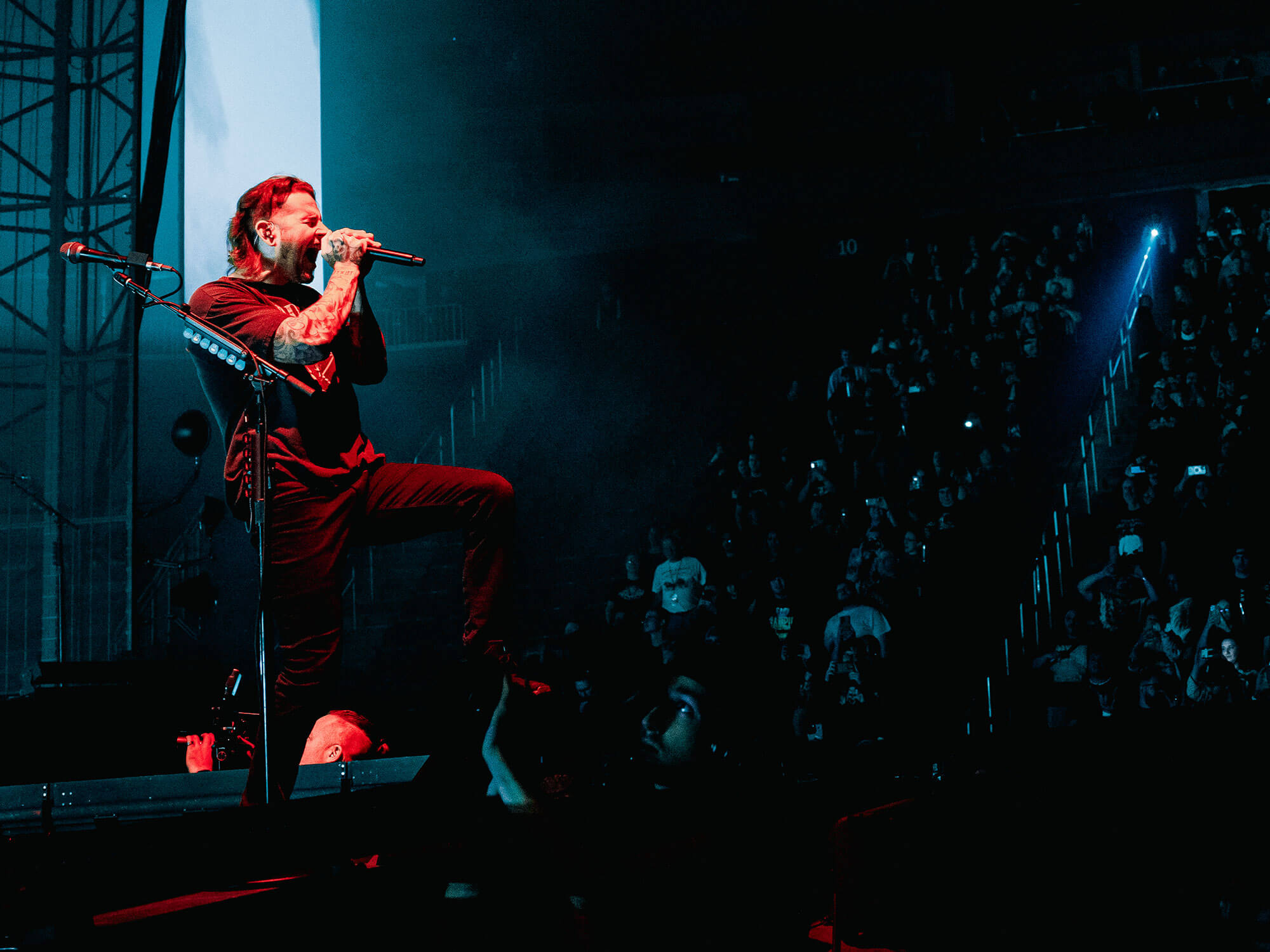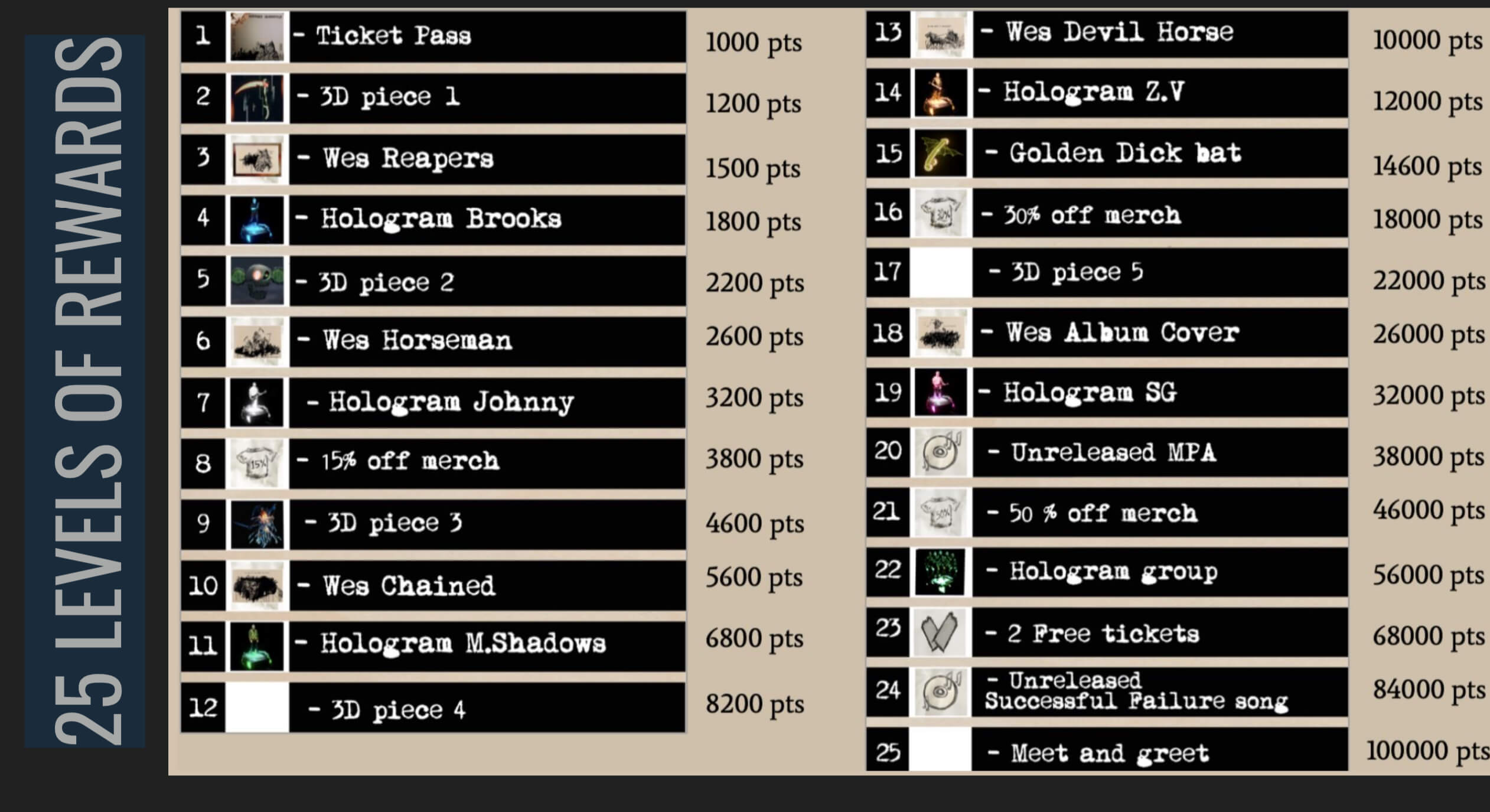![[L-R] M. Shadows and Johnny Christ of Avenged Sevenfold performing onstage](https://musictech.com/wp-content/uploads/2024/04/A7X-4@2000x1500.jpg)
“We’re taking power away from corporate networks, and saying, ‘No, we’re gonna reward our fans, not you’”: M. Shadows on Avenged Sevenfold’s new Fortnite-style Season Pass
One of metal’s most pragmatic frontmen discusses the future of music and web3, why the blockchain is the best vehicle for artist-fan relationships, and why he no longer has time for the sceptics.
Credit: Dangit Bee!
25 years into a career that’s taken them to the very stratosphere of metal, Avenged Sevenfold could be forgiven for resting on their laurels — they’re doing anything but.
The Huntington Beach five-piece have conquered just about every territory on Earth, amassing legions of devoted fans in the process, and they’re hellbent on making life better for every single one of them.
In 2021, the band launched Deathbats Club – an NFT-based fanclub that rewards members with real-world utility like merch discounts and meet and greets. But, while many fans got onboard, it drew scepticism from those averse to blockchain tech and web3.
But A7X remain firm on the vision. They’ve just launched Season Pass, a Fortnite-, Call of Duty– style progression system that lets fans earn points and unlock rewards.
Speaking to MusicTech from a hotel room in Connecticut on the third leg of their Life Is But A Dream… tour, frontman M. Shadows discusses Season Pass and the future of web3 in music, and why he no longer has time for the naysayers.

How did the idea for Season Pass first come about?
“From a comment by David Marcus at Ticketmaster. We’d done all this work with Deathbats Club and token-gated ticketing and trying to find authentic web3 ways that make life better – not just piling it on top of things that are already good.
“One of the things Ticketmaster battles with is not only a public persona, because they kind of take the brunt of a lot of artist decisions, which is by design, obviously. But they don’t have a lot of control over who gets tickets. Codes can always be shared, and promoters can individually raise ticket prices.
“So, without getting into the nuts and bolts of all that, one of their biggest problems is getting tickets to the right fans, if the artist wants to. We clearly wanted to, so token gating seemed like a good thing.
“And one of the comments he made to me was, ‘This is great, but you have 6,000 people in [Deathbats Club]; how do you get this to a larger audience and get everybody in your fanbase involved in a way that’s meaningful?’ So we came up with a thing called Ticket Pass which is a free download, just an NFT in your wallet, and used that to guide people into token-gated ticketing.
“That becomes a problem if you’re Taylor Swift, because every scalper can just take this free thing. So I thought, ‘What if there was a barrier to entry, and we had to prove that you were a fan in some way — how would you prove it?’ Well, do you listen to the music, do you buy merch, do you go to shows?
“So the idea was, ‘Let’s take all these ingest points, and then we start counting them up and rewarding people with these things knowing that they’re fans.’
“And that was the beginning of, ‘Oh, this is a Battle Pass. This is what Fortnite does and this is what Call of Duty does.’ But the problem with what they do is you don’t own anything, you rent it. And so our twist on it is there’s a higher barrier to entry, you have to get a wallet, you have to understand a little bit about the blockchain. But the cool part is you own what you earn.”
![[L-R] Zacky Vengeance, M. Shadows and Synyster Gates of Avenged Sevenfold performing onstage](https://musictech.com/wp-content/uploads/2024/04/A7X-1@2000x1500.jpg)
It feels like you’re paving the way in terms of crafting meaningful community experiences for your fans. How does Season Pass tie into that goal?
“If you look at the traditional music industry, the way it works now is you have all these different entities, whether it’s your merch company, or your record label, streaming services, Ticketmaster, Live Nation, whatever it is. We’re dealing with all of them.
“The same fan that wears your T-shirt goes to the shows, the same fan that goes to the shows listens to your music. But all these corporate networks want to keep the data to themselves, and they also want to reward the fans in their own corporate network.
“[Corporations] want to come to the artist and say, ‘We’ve built a business off of you, and now we want to reward the fan, but you can’t reward the fan, we want you to allow us to reward the fan in our own way.’
“And we’re taking that power away from them, and saying, ‘No, we’re gonna reward the fan – who is the same fan that participates in all of your corporate networks – and we’re gonna reward them in the way that we feel is the most meaningful, which is access to us, things that we want to give them, not through [corporate networks] but through us.’
“Web3 is a great way to do that. We’ve never charged for meet and greets, we don’t believe in it. We’ve never done it in our whole career. But if you’re a fan that really deserves a meet and greet, if you’re spending all this money on our store and you’re listening to us non-stop, we want you to be able to earn these things, and we want you to actually own it.
“So the market is up to you – if you wanna sell this thing, the fans can decide what it’s worth. Is it worth $1? Is it worth $3,000? And I think letting the market decide is a cool aspect of this. So giving the fans complete ownership of the rewards is the most web3, cool thing we can do for the community in our opinion.”

Rewarding fans for what they’re already doing seems like a no-brainer, but a lot of fans are still sceptical. Is there potential for those fans to be swayed, or do you just accept that some people get it and some people don’t?
“I’m at the latter point at this point. To me it’s a no-brainer. We’ve explained it so many times. We can put out a new record and people are gonna complain; we can do a VR concert, people are gonna complain.
“In fact, we just did this really cool thing – I almost don’t even wanna talk about it because we’re the first band to do it – we have this AI in real-time that we’re using on our IMAG where when it’s filming us we can prompt anything we want in it at any time and use a toggle [to determine] how much we use it on the screen.
“And, literally, the first comments were like, ‘They’re using this stupid AI thing.’ And so, honestly, I’m just done. The people that get it are gonna get it. The people that aren’t gonna get it are gonna dig their heels in.
“Every time we do anything, people complain about it. It’s just part of being in this business.”
It’s hard to understand why people get mad – you’re doing the same things you’ve always done. You’re just adding more.
“Right, the VR concert was mind-boggling to us because people were saying, ‘They’re lazy, they’re not gonna go on tour.’ And it’s like, ‘There are 36 tour dates [on the LIBAD tour], what are you talking about?’ We can’t be in your city every night. You don’t think it’s cool that you can put on a headset and watch a show in a different way?”
![[L-R] Zacky Vengeance, Synyster Gates, M. Shadows and Johnny Christ of Avenged Sevenfold performing onstage](https://musictech.com/wp-content/uploads/2024/04/A7X-3@2000x1500.jpg)
What’s your prediction on the wider adoption of web3 technology in music?
“I’m interested in getting royalty payments on-chain. Having complete transparency with streaming services [is a good thing]. There’s a bunch of corporate networks that need to be broken down.
“As of a couple of months ago, we’re free agents. We don’t have a label, we’re not gonna be signing with a label. It’s just not of any interest to us. So now we can put our music on web3, we can be on Spotify, we can be in all worlds at once.
“A lot of artists can’t because they’re locked into old record deals, and the record labels own a portion of their catalogues. So this gets into deeper situations, but I think web3 with royalties on chain, NFTs as collectibles, blockchain as fanclubs, you’re gonna see a bunch of different ways people can interact.
“You’ve got Coinbase working on new wallets, where there’s one-touch purchasing. All these things are gonna make it easier for users to get in. We’re more of a hardcore example. We’re forcing people to have their own seed phrase and custodial wallet. We don’t want any responsibility for their stuff. We want them to have ownership.
“We have a more hardcore stance on it but people are gonna have easier ramps in. And I think that’s gonna come from so many different places. It’ll come from Coinbase, MetaMask, people that are innovating and trying to get people in and it’s going to make music easier, because people are gonna have this day-to-day like, ‘I have this crypto wallet, it’s a one-touch and I can buy from Amazon or Shopify, and I can also join this fanclub.’
“It’s all getting figured out, but the future is bright. Any of the 6,000 people in the Deathbats Club will tell you, ‘I don’t want it any other way.’ And it’s gonna take time for that to permeate into society and for other artists to say, ‘We’re gonna put the work in and build out something like this.’ Because it did take us a lot of work. We were building for two years in the bear market, even though that was irrelevant to us; the price didn’t ever matter.
“But we were building for two years when everyone else gave up on it. They didn’t see the vision, they didn’t care about the technology, they didn’t understand it. They were just trying to fucking sell shit to their fans.”
MusicTech’s audience consists of producers, DJs and beatmakers, many of whom want to maximise their royalties from Spotify and other streaming services. Is blockchain really the future?
“I’m not the biggest hater of Spotify. If you read Chris Dixon’s book [Read Write Own: Building the Next Era of the Internet], he says music never really adapted to the internet like video games did. They figured out a way to give away games for free and make more money than ever. Music fought with litigation. And then all of sudden, when you had no other choice, you sold out to a couple companies for catalogue.
“The reason a lot of people don’t get paid a lot on Spotify is that they have shitty record deals. We had a shitty record deal. And the fact that you signed in 1999 when you were 18 and you had no money, that’s a lot different than all of a sudden the internet coming along, streaming services being born and you still make 24 cents on the dollar, and Spotify is paying what it pays.
“Not every artist deserves to be rich. You have to have market share. People have to want to listen to you. It’s not, ‘Oh, I’m an artist, I should get paid more.’ It’s just not how it works.
“But my biggest problem with Spotify is that they don’t share the data with the artist. Web3 takes care of this; you can take your data as an artist and go somewhere else. So I don’t hate Spotify, I just wish they’d share with us who our listeners are, and they don’t.”
This era of Season Pass is Life Is But A Dream… Season 1. If this is anything like Call of Duty, we’re led to believe there’ll be a Life Is But A Dream… Season 2 and so on, but might we see Season 1 of the next album in a couple of years?
“Life Is But A Dream… will be the only season for this record. We’re gonna adapt to what people like about the season, what rewards they like, and we really wanna just listen to the fans and say, ‘What do you guys want these rewards to be?’
“So we’ll learn a lot. Maybe it’s 50 rewards. Call of Duty went from one thing to a hundred different tiers for all these games now.
“We’re just gonna listen. Next year might be a lot of touring in markets that we’ve never been, so maybe the Season Pass has something to do with that. Every season will have to do with whatever is coming in the next year. If music comes in 2025 or 2026, that Pass will be based on whatever that project is. And when we’re not doing records, it’ll be based on touring.”
This is the big thing with innovation – you’re discovering as you go, and there really isn’t a blueprint to this.
“Right – I think having a blueprint would be irresponsible because we just don’t know. We looked at the biggest buyers on Shopify, how many people listened to us, how much it grew this year – those are the numbers we do get shared – and how many tickets we sold, how much merch we sold on tour, and then we just tried to do math. And we said, ‘If this guy that spends $7,000 on the store also went to five shows, and also is listening to us, we think that guy deserves a meet and greet.’ So what does that number look like going backwards? And that’s kind of how we did it.”

It sounds like a forward-thinking way to give fans more – it must be frustrating to hear people knocking it.
“Welcome to my life! [laughs]”
That said, there’s clearly a large section of the fanbase that is getting on with what you’re doing – you have 6,000 members in the Deathbats Club.
“Yeah – every show, we’re getting about 250-275 people signing up for Season Pass. It looks like we’re selling about three to four Deathbats Club [NFTs] a day, and the floor is like $450 to get in, with the price of Ethereum, [at least].
“And we’re getting about 75-150 items a night being scanned in – just people participating in Season Pass. So it’s one of those things where if you extrapolate that, it’s gonna be great. We’ve just gotta keep letting people know about it.
“If you scan your T-shirt between 8pm and 9pm it comes up on the big screens in person, live. It’s geo-targetted to the arena, and one person wins a meet and greet for two, that night, right on the spot.
“These are all the things you can do with the NFC tags and the NFTs but those sorts of things are getting people to scan, which instantly shows you Season Pass, which instantly says, ‘Hey, there’s points available!’ And so I think you’ve just gotta keep feeding people the right stuff and walking them in.”
Do you see virtual reality concerts being adopted more frequently by other bands? What motivated you to put that together?
“It’s an experience unlike any other, so in my opinion, it has its right to exist.
“We don’t put ourselves in music videos anymore. With the way budgets are and the way music videos are, it just doesn’t make sense to us. It seems a little cheesy. So we’ve been doing stop motion in different ways to put our art out there.
“And we also think that live DVDs are played out. You can go and find any show on YouTube, every single night, every song. So to put all this resource [doesn’t seem worth it].
“VR is amazing because it checks the box of ‘People get to see us live,’ but they get to do it in a way that has never been experienced before – you are in the production. You are a part of the show.
“And so to us, to all the people saying, ’Just make a DVD!’ or ‘Just put yourselves in the videos!’ – that’s what this is, but this is the next iteration of it. This is the cool version of what you’re asking for.
“It blows my mind that there’s any sort of pushback on VR concerts. They are here to stay. I cannot wait until more artists that I enjoy do them. They’re extremely interesting and uncomfortable because you’re right there next to that person.
“It’s a medium where there’s so much to explore. It’s a video game, a movie, a play, it’s live, it’s interactive – it’s everything. And it’s just gonna get better and better. It takes all of those things that people are wishing for and just wraps it up into a new thing.”
“[A lot of the criticism is like], ‘You don’t care about the poor fans.’ And it’s like, actually we’re on tour, we play a lot of shows, and we can’t be in your city every night. In fact, we probably come to your city once every two to five years. So the fact that we’re making something that you can see the show, but even better, there’s just nothing to complain about, but people always find a way. It just is what it is.”
![[L-R] M. Shadows and Synyster Gates of Avenged Sevenfold performing onstage](https://musictech.com/wp-content/uploads/2024/04/A7X-5@2000x1500.jpg)